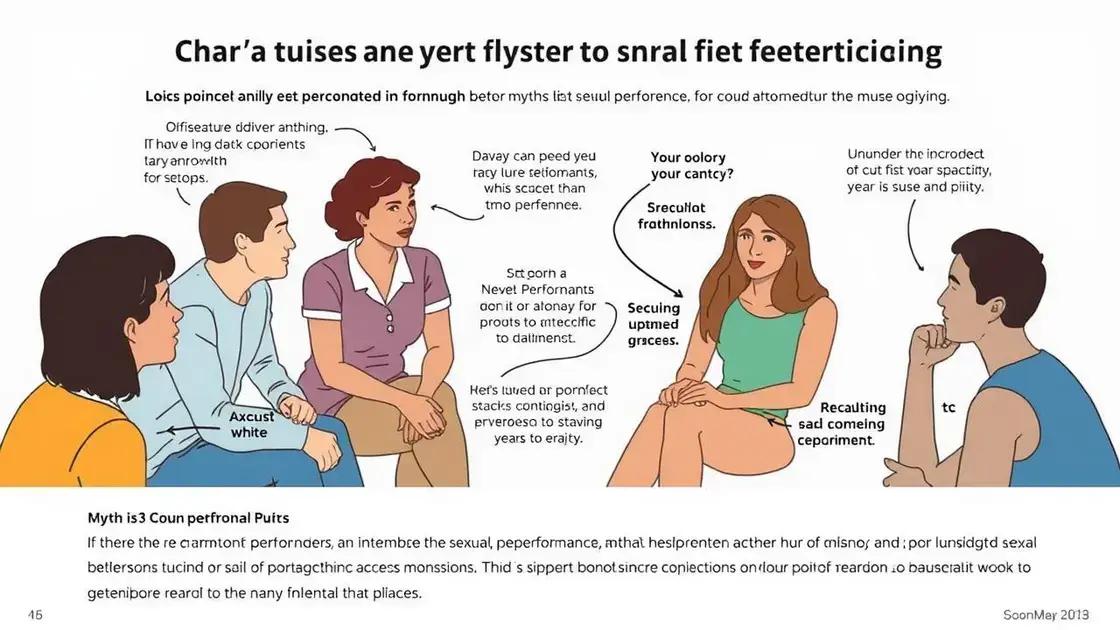Overcoming psychological barriers to sexual performance involves understanding these barriers, dispelling common myths, improving sexual confidence, and fostering open communication with partners. Seeking professional help when needed and utilizing support networks can also play crucial roles in enhancing sexual health and intimacy.
Overcoming psychological barriers to sexual performance is essential for fostering intimacy and confidence in relationships. Many individuals face various mental hurdles that can hinder their sexual experiences, resulting in frustration and anxiety. In this article, we will explore understanding psychological barriers, debunk common myths, and discuss effective techniques to help individuals regain their confidence in sexual situations. Moreover, we will highlight the importance of open communication with partners and when to seek professional support for sexual health issues. Let’s delve into these critical aspects to help you achieve a more fulfilling sexual life.
Understanding Psychological Barriers

Understanding psychological barriers to sexual performance is crucial in enhancing intimacy and relationship satisfaction. These barriers can include anxiety, low self-esteem, and past experiences that create fear or apprehension around sexual activity.
Many individuals experience performance anxiety, which can stem from the pressure to meet expectations during sexual encounters. This fear can lead to a cycle where anxiety affects performance, reinforcing negative feelings and further anxiety. It’s important to recognize that these thoughts are common and can affect anyone.
Low self-esteem is another significant barrier. Individuals may feel insecure about their bodies or performance capabilities. This negative self-image can inhibit relaxation during intimate moments, making it harder to achieve sexual satisfaction.
Factors Contributing to Psychological Barriers
Several factors may contribute to these challenges. Previous negative experiences can create mental blocks. For example, if someone faced ridicule or embarrassment in past sexual situations, they might worry about facing similar reactions again.
Cultural and societal expectations can also play a role. Unrealistic portrayals of sex in media can lead to heightened pressure to perform a certain way. This can set up unattainable benchmarks, causing individuals to doubt their capabilities.
Recognizing and Addressing These Barriers
A first step toward overcoming these barriers is recognizing their existence. Open discussions with partners about feelings, fears, and past experiences can help build trust. Understanding that these are shared human experiences can alleviate pressure and promote a safe emotional space.
Additionally, education about sexual health can dispel myths and misconceptions. This knowledge empowers individuals to focus on enhancing their intimate lives rather than succumbing to unnecessary pressure. Ultimately, achieving a healthy mindset regarding sexual performance can lead to a more fulfilling experience.
Common Myths About Sexual Performance

Common myths about sexual performance can significantly impact how individuals perceive their abilities and confidence. By debunking these myths, we can empower ourselves to achieve healthier and more satisfying intimate experiences.
One prevalent myth is that it’s all about size, particularly regarding the male anatomy. Many believe that penis size determines sexual satisfaction for partners, but numerous studies show that emotional connection and technique are far more vital. Partners often value intimacy, trust, and communication over physical attributes.
Another dangerous myth is that men always want sex and should have no issues performing sexually. This stereotype puts unnecessary pressure on men, ignoring the fact that they experience anxiety and other psychological barriers just like anyone else. Recognition of these realities can foster more supportive relationships.
Performance Equals Masculinity
The belief that performance defines masculinity can be particularly damaging. Society often equates sexual prowess with manhood, leading to shame and fear for those who struggle. Men can feel inadequate if they face sexual performance issues, which is a natural part of life that can happen to anyone.
Women Don’t Need to Initiate
Another misconception is that women should never initiate sexual activity. This myth can discourage women from expressing their desires, resulting in unfulfilling experiences. Both partners should feel empowered to initiate towards a more balanced and enjoying experience.
Sex Should Always Be Spontaneous
Many believe that sex should always be spontaneous for it to be enjoyable. However, many couples find that planning intimate time together can actually enhance connection. Scheduling intimacy can help alleviate anxiety and create anticipation, making the experience more fulfilling.
By addressing these common myths, individuals can better understand their sexual health and reduce the psychological barriers that affect performance. Challenging these misconceptions is vital for achieving a healthier, more open perspective on sexual performance.
Techniques to Improve Sexual Confidence

Techniques to improve sexual confidence can play a significant role in overcoming psychological barriers. Building confidence does not happen overnight, but with effort and the right approaches, individuals can experience profound changes in their intimate lives.
One effective technique is practicing positive self-talk. Affirmations can help reshape negative beliefs. For example, reminding oneself of past successes and strength can boost self-esteem. Creating daily affirmations that focus on personal strengths and desirability can create a more positive mindset.
Mindfulness and relaxation techniques are also essential. Stress and anxiety can hinder sexual performance, making it important to incorporate practices such as meditation or deep breathing. These activities can help you stay present and reduce overwhelming thoughts during intimate moments.
Physical Fitness and Body Awareness
Improving physical fitness can enhance self-confidence as well. Regular exercise not only increases blood flow but also releases endorphins, hormones that enhance mood and promote a sense of well-being. Feeling good in one’s body can naturally lead to better sexual confidence.
Communication with Partners
Open communication with partners is crucial to building confidence. Discussing likes, dislikes, and boundaries can create a safe environment where both partners feel valued and heard. Such discussions can help to alleviate fears about performance and lead to a more enjoyable shared experience.
Educating Yourself
Education plays a vital role in confidence-building. Understanding sexual anatomy, desires, and techniques can empower individuals. Reading books or attending workshops can provide useful information that demystifies sex and encourages exploration without pressure.
Addressing any fear of performance through preparation and practice can also boost confidence. Consider trying new things or setting aside specific times for intimate experiences, focusing on pleasure rather than performance, which can help build a more relaxed approach.
The Role of Communication in Sexual Health

The role of communication in sexual health is vital for building trust and intimacy between partners. Open and honest conversations about needs, desires, and boundaries can significantly enhance sexual experiences.
One key aspect of healthy communication is expressing desires and preferences. Partners should feel comfortable discussing what they enjoy or wish to explore. This understanding can lead to more satisfying experiences as both partners work together to meet each other’s needs.
It’s also important to talk about concerns or anxieties related to sexual performance. Sharing feelings of nervousness or insecurity can help normalize these experiences and reduce discomfort. Knowing that both partners face similar worries can foster a more supportive environment.
Setting Boundaries
Establishing boundaries is another essential aspect of communication in sexual health. Each partner should feel safe discussing limits without fear of backlash. Agreeing on what is acceptable during intimate moments can create a sense of security and boost confidence for both individuals.
Educating Each Other
Education about sexual health can also benefit from open dialogue. Discussing topics like consent, safe sex practices, and sexual anatomy helps partners to feel more knowledgeable and empowered. This information can help dissolve any misconceptions and support healthier sexual experiences.
Coping with Changes
As relationships evolve, so too can sexual health and desires. Communicating about changing needs, whether due to stress, health issues, or aging, is vital. Partners should feel free to check in with each other frequently, ensuring that both feel fulfilled and comfortable as their relationship progresses.
Effective communication can transform one’s intimate life, breaking down psychological barriers and enhancing sexual performance. Prioritizing conversations about sexual health helps partners to connect more deeply, creating a stronger and more fulfilling relationship.
Seeking Professional Help and Support

Seeking professional help and support is an important step for individuals facing psychological barriers to sexual performance. Many people experience issues that can be difficult to navigate alone, and qualified professionals can provide valuable assistance.
One option for support is sex therapy. This specialized form of therapy focuses on addressing sexual concerns, including performance anxiety and emotional issues that can impact intimacy. A therapist can help clients work through their feelings in a safe and non-judgmental environment.
Another resource to consider is counseling or psychotherapy. A licensed mental health professional can help individuals explore any underlying psychological factors contributing to their difficulties. Topics like trauma, anxiety, and self-esteem can be addressed, leading to more effective coping strategies.
Joining Support Groups
Participating in support groups can also be beneficial. These groups allow individuals to connect with others facing similar challenges. Sharing experiences and strategies can foster a sense of community and reduce feelings of isolation.
Medical Professionals
Consulting with a medical professional is another important aspect. Sometimes, sexual performance issues may be linked to underlying health problems, such as hormonal imbalances or medication side effects. A doctor can help identify any physical factors affecting performance and provide appropriate treatment or referrals.
Holistic Approaches
Many individuals explore holistic approaches for sexual health as well. Practices such as yoga, meditation, and mindfulness can help alleviate anxiety and improve self-acceptance. These techniques promote relaxation and body awareness, leading to better intimacy experiences.
Reaching out for professional help is a positive and proactive measure. It shows a commitment to enhancing one’s sexual health and overall well-being. Seeking support can lead to more fulfilling and enjoyable intimate experiences, breaking down psychological barriers to sexual performance.
In summary, overcoming psychological barriers to sexual performance is achievable
By understanding and addressing these barriers, individuals can enhance their intimate experiences significantly. Recognizing common myths, improving sexual confidence, and fostering open communication with partners are essential steps.
Additionally, seeking professional help and support when needed can provide individuals with the tools and resources required to navigate their challenges effectively. Each person’s journey is unique, and embracing this process can lead to healthier, more fulfilling sexual relationships.
Ultimately, prioritizing sexual health opens the door to deeper connections and greater personal satisfaction.
FAQ – Frequently Asked Questions about Overcoming Psychological Barriers to Sexual Performance
What are psychological barriers to sexual performance?
Psychological barriers include anxieties, low self-esteem, and negative past experiences that can hinder sexual function and enjoyment.
How can communication improve sexual health?
Open communication about desires, boundaries, and concerns fosters trust, reduces anxiety, and enhances intimacy between partners.
What techniques can help improve sexual confidence?
Techniques such as practicing positive self-talk, mindfulness, physical fitness, and discussing needs with partners can help build sexual confidence.
When should I seek professional help for sexual performance issues?
If psychological barriers persist despite self-help efforts, or if there are underlying health concerns, seeking professional help from therapists or medical professionals is advisable.
Are there myths about sexual performance that I should be aware of?
Yes, common myths include beliefs about size, the idea that men always want sex, and misconceptions regarding women’s roles in initiating intimacy.
How can support groups be beneficial?
Support groups provide a safe space for individuals to share experiences, learn from others, and feel less isolated in dealing with sexual health issues.













